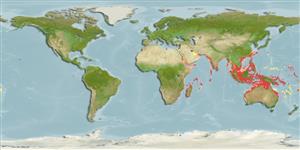Environment: milieu / climate zone / depth range / distribution range
Ecology
Marine; reef-associated; depth range 0 - 90 m (Ref. 9710). Tropical; 28°N - 35°S, 26°E - 149°W (Ref. 57373)
Indo-West Pacific: East Africa, India, and Malaysia to the Moluccas, north to Taiwan, south to northern Australia. Single record from Fiji. Appears to be absent from oceanic islands of the Indian Ocean.
Size / Weight / Age
Maturity: Lm ? range ? - ? cm
Max length : 20.0 cm TL male/unsexed; (Ref. 4113)
Short description
Identification keys | Morphology | Morphometrics
Dorsal spines (total): 3; Dorsal soft rays (total): 13; Anal spines: 0; Anal soft rays: 7. First dorsal spine about the same length as the 2nd dorsal spine, with a large tuff of filaments. Ground color of head and body light-tan with narrow blackish brown streaks. All fins with blackish-brown spots. Illicium longer than next dorsal fin ray with small rounded to elongate esca (Ref. 48635). Attains 45 cm SL.
Inhabits still muddy habitats that are either deep or offshore (Ref. 48635) or shallow rocky and coral reefs (Ref. 9710). Oviparous. Eggs are bound in ribbon-like sheath or mass of gelatinous mucus called 'egg raft' or 'veil' (Ref. 6773). Minimum depth reported taken from Ref. 57178. Solitary and often among leaf-eater debris (Ref 90102).
Life cycle and mating behavior
Maturity | Reproduction | Spawning | Eggs | Fecundity | Larvae
Oviparous. Eggs are bound in ribbon-like sheath or mass of gelatinous mucus called 'egg raft' or 'veil' (Ref. 6773).
Pietsch, T.W. and D.B. Grobecker, 1987. Frogfishes of the world. Systematics, zoogeography, and behavioral ecology. Stanford University Press, Stanford, California. 420 p. (Ref. 6773)
IUCN Red List Status (Ref. 130435: Version 2024-2)
Threat to humans
Harmless
Human uses
Tools
Special reports
Download XML
Internet sources
Estimates based on models
Preferred temperature (Ref.
123201): 24.6 - 29.1, mean 28.1 °C (based on 1846 cells).
Phylogenetic diversity index (Ref.
82804): PD
50 = 0.5005 [Uniqueness, from 0.5 = low to 2.0 = high].
Bayesian length-weight: a=0.02630 (0.01029 - 0.06725), b=2.96 (2.73 - 3.19), in cm total length, based on LWR estimates for this (Sub)family-body shape (Ref.
93245).
Trophic level (Ref.
69278): 4.2 ±0.73 se; based on food items.
Resilience (Ref.
120179): High, minimum population doubling time less than 15 months (Fec assumed to be > 10,000).
Fishing Vulnerability (Ref.
59153): Low vulnerability (10 of 100).
Nutrients (Ref.
124155): Calcium = 52.2 [25.3, 93.0] mg/100g; Iron = 0.623 [0.324, 1.126] mg/100g; Protein = 18.7 [16.2, 22.0] %; Omega3 = 0.122 [0.046, 0.307] g/100g; Selenium = 28.1 [12.5, 69.5] μg/100g; VitaminA = 180 [44, 716] μg/100g; Zinc = 1.03 [0.64, 1.60] mg/100g (wet weight);
